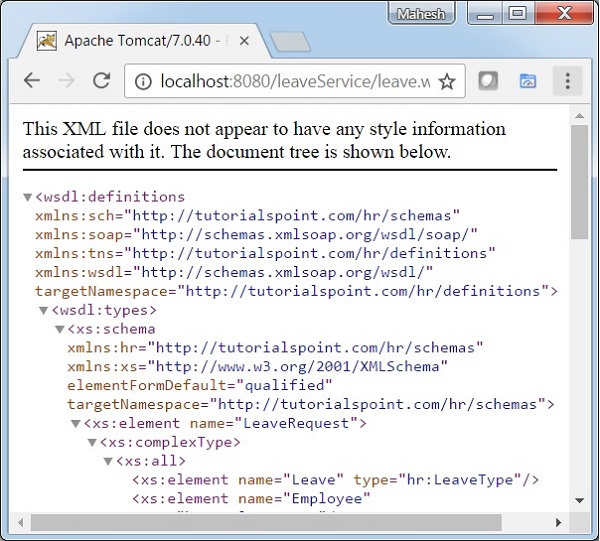SpringWS-静的WSDL
前の章「Spring-WS-最初のアプリケーション」では、SpringWS構成を使用してWSDLを自動的に生成しました。この場合、SpringWSを使用して既存のWSDLを公開する方法を示します。
| ステップ | 説明 |
|---|---|
| 1 | Spring WS-First Applicationの章で説明されているように、パッケージcom.tutorialspointの下にleaveServiceという名前のプロジェクトを作成します。 |
| 2 | / WEB-INF / wsdlサブフォルダーの下にWSDLleave.wsdlを作成します。 |
| 3 | / WEB-INFサブフォルダーの下のspring-ws-servlet.xmlを更新します。ここでは、dynamic-wsdlの代わりにstatic-wsdlタグを使用しています。 |
| 4 | 最後のステップは、以下で説明するように、すべてのソースファイルと構成ファイルのコンテンツを作成し、アプリケーションをエクスポートすることです。 |
/WEB-INF/spring-ws-servlet.xml
<wsdl:definitions xmlns:wsdl = "http://schemas.xmlsoap.org/wsdl/"
xmlns:soap = "http://schemas.xmlsoap.org/wsdl/soap/"
xmlns:schema = "http://tutorialspoint.com/hr/schemas"
xmlns:tns = "http://tutorialspoint.com/hr/definitions"
targetNamespace = "http://tutorialspoint.com/hr/definitions">
<wsdl:types>
<xsd:schema xmlns:xsd = "http://www.w3.org/2001/XMLSchema">
<xsd:import namespace = "http://tutorialspoint.com/hr/schemas"
schemaLocation = "hr.xsd"/>
</xsd:schema>
</wsdl:types>
<wsdl:message name = "LeaveRequest">
<wsdl:part element = "schema:LeaveRequest" name = "LeaveRequest"/>
</wsdl:message>
<wsdl:portType name = "HumanResource">
<wsdl:operation name = "Leave">
<wsdl:input message = "tns:LeaveRequest" name = "LeaveRequest"/>
</wsdl:operation>
</wsdl:portType>
<wsdl:binding name = "HumanResourceBinding" type = "tns:HumanResource">
<soap:binding style = "document"
transport = "http://schemas.xmlsoap.org/soap/http"/>
<wsdl:operation name = "Leave">
<soap:operation soapAction = "http://mycompany.com/RequestLeave"/>
<wsdl:input name = "LeaveRequest">
<soap:body use = "literal"/>
</wsdl:input>
</wsdl:operation>
</wsdl:binding>
<wsdl:service name = "HumanResourceService">
<wsdl:port binding = "tns:HumanResourceBinding" name = "HumanResourcePort">
<soap:address location = "http://localhost:8080/leaveService/"/>
</wsdl:port>
</wsdl:service>
</wsdl:definitions>/WEB-INF/spring-ws-servlet.xml
<beans xmlns = "http://www.springframework.org/schema/beans"
xmlns:xsi = "http://www.w3.org/2001/XMLSchema-instance"
xmlns:context = "http://www.springframework.org/schema/context"
xmlns:sws = "http://www.springframework.org/schema/web-services"
xsi:schemaLocation = "http://www.springframework.org/schema/beans
http://www.springframework.org/schema/beans/spring-beans-3.0.xsd
http://www.springframework.org/schema/web-services
http://www.springframework.org/schema/web-services/web-services-2.0.xsd
http://www.springframework.org/schema/context
http://www.springframework.org/schema/context/spring-context-3.0.xsd">
<context:component-scan base-package = "com.tutorialspoint.hr"/>
<sws:annotation-driven/>
<sws:static-wsdl id = "leave" location = "/WEB-INF/wsdl/leave.wsdl"/>
</beans>プロジェクトを実行する
ソースファイルと構成ファイルの作成が完了したら、アプリケーションをエクスポートする必要があります。アプリケーションを右クリックし、「エクスポート」→「WARファイル」オプションを使用して、LeaveService.warファイルをTomcatのwebappsフォルダーに保存します。
ここで、Tomcatサーバーを起動し、標準のブラウザーを使用してwebappsフォルダーから他のWebページにアクセスできることを確認します。URL – http:// localhost:8080 / LeaveService / Leave.wsdlにアクセスしてみてください。SpringWebアプリケーションですべて問題がなければ、次の画面が表示されます。
